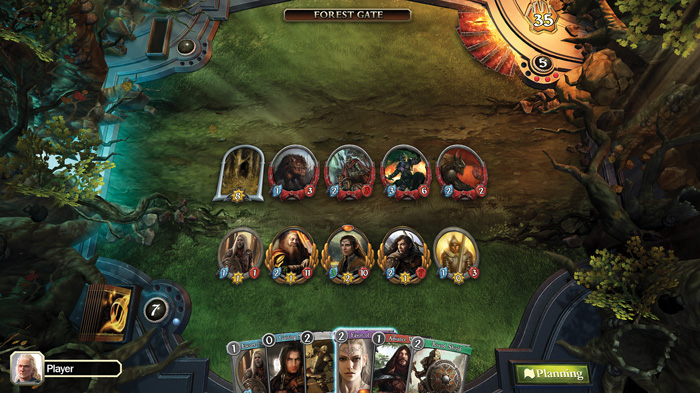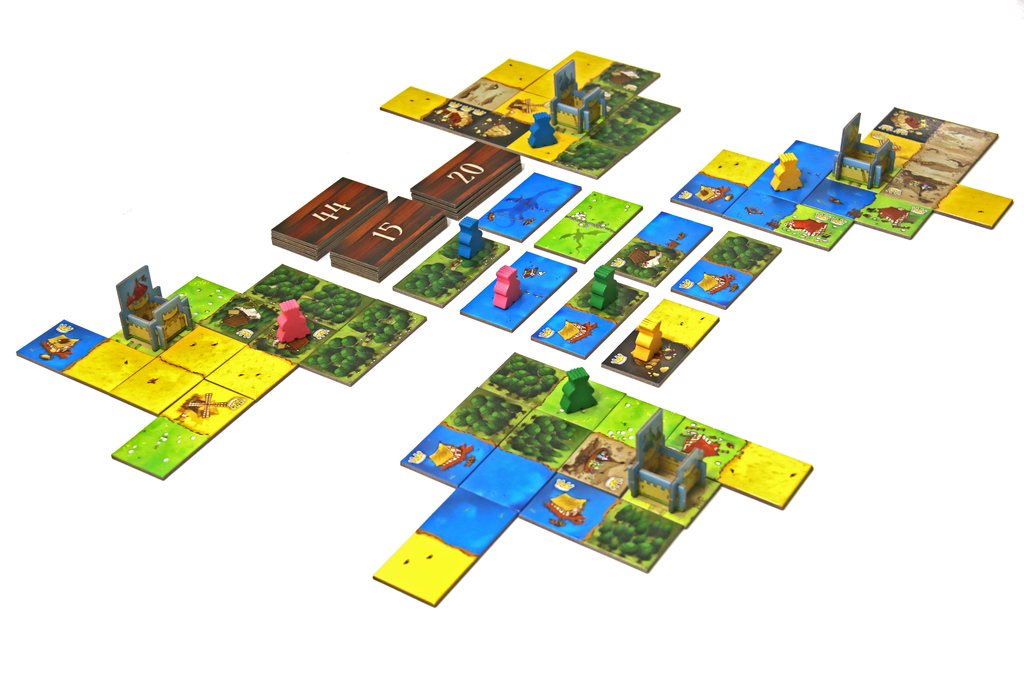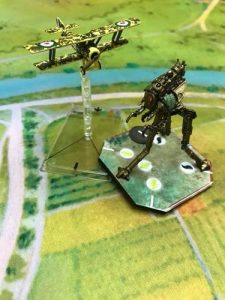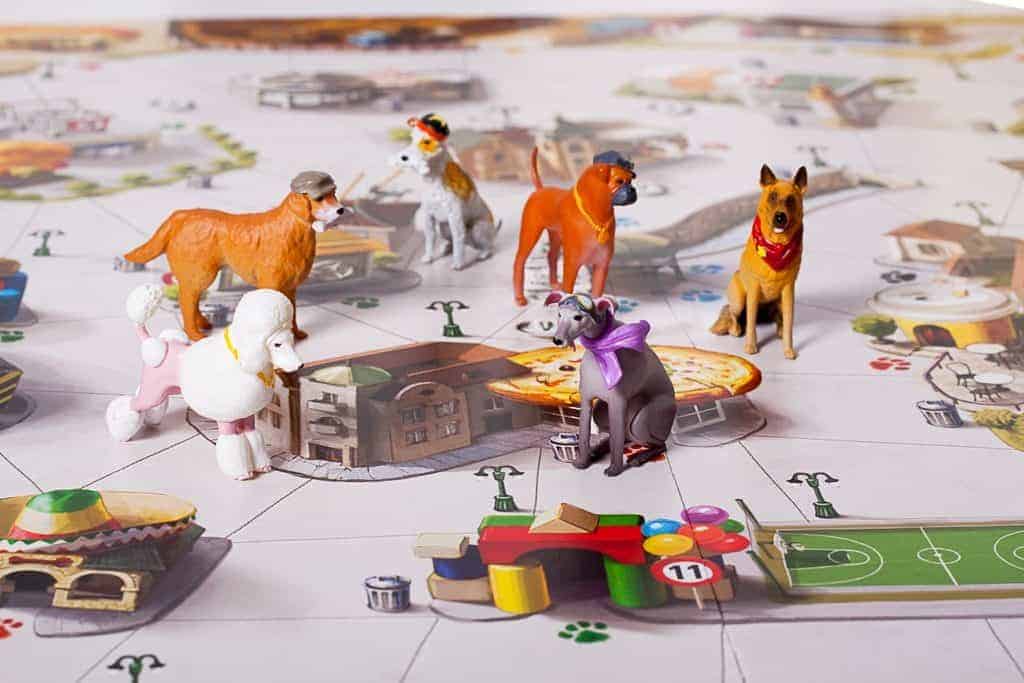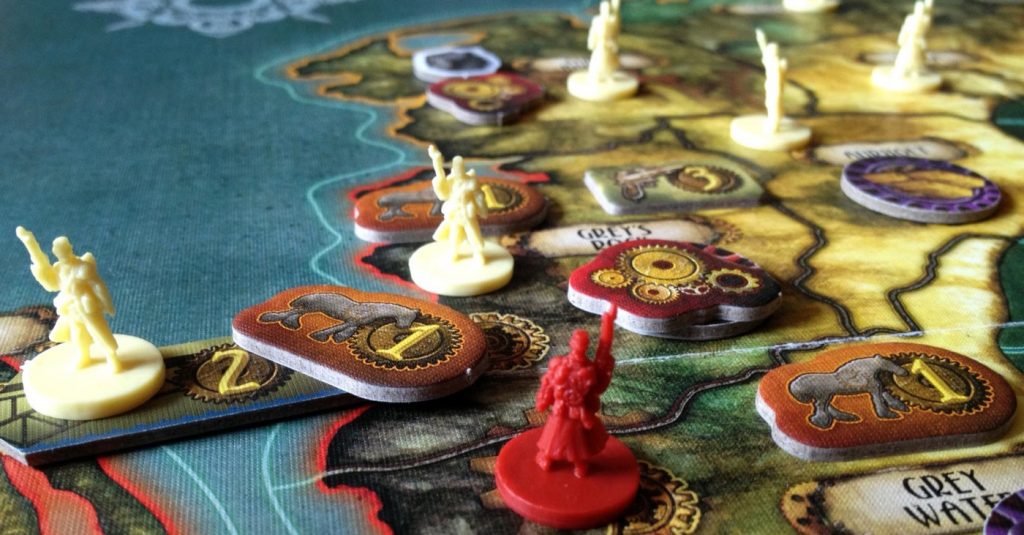Paul: Good morning, Quintin!
Quinns: Good morning, Paul. How are you on this brisk winter’s morning?
Paul: I am so refreshed and wholesome.
Quinns: I slept curled up, and a draft in my bedroom froze me into a parenthesis.
Paul: What does that look like?
Quinns: )
But nevermind my failing body. Paul, voting has begun for the annual Pearple’s Choice awards on the SU&SD forum! Everybody reading this should go and vote for their games of 2017, and we’ll be discussing the results on our year-end podcast. Vote now to replace disappointment with frustration! Isn’t democracy fun!
Paul: This could be my year, Quinns. I’m taking one of those babies home!
Quinns: For the last time, Paul, you are not a board game.
Other things that aren’t board games include Fantasy Flight’s newly-announced video game adaptation of The Lord of the Rings: The Card Game. A beta will be arriving on Steam’s early access program “soon”, and oh my, it looks a lot like Blizzard’s hellaciously popular digital card game Hearthstone. Then again, perhaps it would have been silly for Fantasy Flight Interactive to make it look like anything else.
It’s a big announcement, not because The Lord of the Rings LCG is particular popular, but because it’s a sign of things to come. If this release isn’t a total disaster, surely we can’t be that far away from people playing Netrunner on their tablets or Star Wars: Armada on their work computers?
In the meantime, if anyone does want a truly fantastic digital card game, Duelyst is the best one that team SU&SD has encountered.
In further news of individual games getting bigger, a couple of designs by prolific French designer Bruno Cathala have had expansions announced.
(Remember the old running joke that “Quinns love expansions?” I still love expansions. Oh boy oh boy oh boy.)
Spiel des Jahres winner Kingdomino will soon enjoy its first expansion, Kingdomino: Age of Giants, which will add “new royal challenge tiles, a tile dispenser tower as well as a castle and king for a fifth player.” This isn’t to be confused with Queendomino, a stand-alone game that can be combined with Kingdomino. As someone who hasn’t played Kingdomino, the word domino has now lost all meaning to me. Domino domino domino domino.
Someone who has played Kingdomino is Paul, who liked it but wasn’t hugely excited by it, which seems to be the way for us and most of the winners of the Spiel des Jahres. That said, we felt the same way about Colt Express until they released the Horses & Stagecoach expansion, which made the game rich enough for us to recommend it. Perhaps combining Kingdomino with Queendomino would make a game more in line with our needs?
The other new expansion is Abyss: Leviathan, the second expansion for Abyss after Abyss: Kraken. Paul and I were a little cold on Abyss when we reviewed it, but my goodness, looking at the above art I found myself as spellbound as when I first saw the art of the original game. What a looker that game is.

And speaking of pretty things, remember Paul’s happy review of Flipships? Designer Kane Klenko has posted a design diary over on Board Game Geek’s fantastic news blog of how the game came about.
Excellently, Kane writes that “It all started because someone left a random token on a table and I was too tired to play a real game…”
Paul: Over on Kickstarter we were startled this week by Tripods and Triplanes, the Wings of Glory game nobody ever saw coming. Usually, Wings of Glory is a fairly serious look at aerial combat World War I, letting you fly famous planes like the Sopwith Camel, AEG DI.ghgh-VI mk. 6 Snötenmousse or Snugglehausen Bumblefly. Now, it features Martians.
Not any old Martians, either, but the same Martians that we know and love from H.G. Wells’ War of the Worlds, teetering around England in their tripods and making us all wonder why an interplanetary invasion made suburban Surrey their primary target. This standalone expansion features two Martian tripods, complete with heat rays, and is fully compatible with the rest of Wings of Glory, meaning you can now fire heat rays at Biggles. The ultimate crossover.
Quinns: But if you’re looking to throw your money at something this week, my personal choice would be Winterhorn, the new RPG from Fiasco designer Jason Morningstar that released this week. It’s a live-action roleplaying game where you play government intelligence specialists working to destroy an activist group from the comfort of a conference room.
Cynthia wrote about the game here, and got me very, very hyped to play it. Here’s the pullquote:
“Jason Morningstar told me he designed Winterhorn to teach real-life activists about the tactics used by modern oppressive regimes. I took away form the game not only a knowledge of those tactics, but also a horrific understanding of how casually corporate these state agencies can be. We talked about birthday parties and favorite pubs as we decided to ruin people’s lives. And yet, underneath our jokes and bravado was an undercurrent of fear. What if one wrong word or the wrong attitude could mean not just getting fired, but getting interrogated, or relocated to a prison camp? In a working group full of spies, how can you tell who is really spying on whom?”
Paul: Today in our “Slightly creepy but also amazing” collection, I present the Neural Network That Invented its own Board Games. Neural Networks are particularly uncanny things, making new and invariably bizarrely imperfect versions of something after you show them a whole bunch of other, real-world examples, and this one was NO DIFFERENT.
After digesting 80,000 titles, it invented Puzzle Spoin, Blood Bout! and Star Munchkin: Hidernament Hothpek of Bazaday (which it says has a BoardGameGeek rating of 6). It’s all well and good laughing at these strange electronic brains as they try to understand things they’ve never played, but it did also burp up Carcassonne: The Card Game /which I am immediately keen to try/. Good work, Weird Robot.
Quinns: Those all sound like games we would invent. Is nobody safe from the spectre of job automation???!!?
Finally, I’d like to link everyone to this article by Jeremy Antley discussing bias and assumptions in simulationist games, with regards to designer Phil Eklund. I knew Eklund only as an avid historian and board game designer when I bought Pax Pamir, only to find myself startled by the appendix in the manual titled “In Defence of Colonialism”. The board game community would do well to consider who’s designing their historic games, and how that will have shaped the design.


